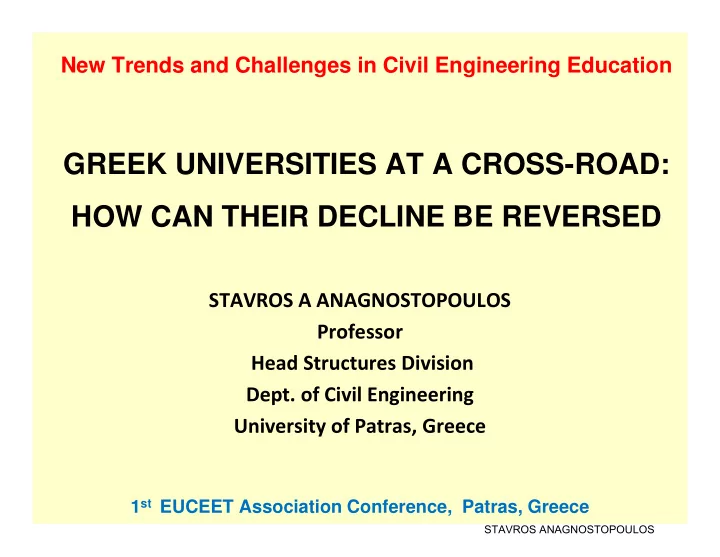

New Trends and Challenges in Civil Engineering Education GREEK UNIVERSITIES AT A CROSS-ROAD: HOW CAN THEIR DECLINE BE REVERSED STAVROS A ANAGNOSTOPOULOS Professor Head Structures Division Dept. of Civil Engineering University of Patras, Greece 1 st EUCEET Association Conference, Patras, Greece STAVROS ANAGNOSTOPOULOS
New Trends and Challenges in Civil Engineering Education COPING WITH THE NEW TRENDS AND MEETING CHALLENGES IN CIVIL ENGINEERING, REQUIRES A UNIVERSITY THAT: • Can carry out its mission successfully • Has mechanisms to correct pertinent problems • Has mechanisms allowing it to change, to follow new trends and meet new challenges STAVROS ANAGNOSTOPOULOS
QUESTION: DO GREEK UNIVERSITIES SATISFY THESE REQUIREMENTS? STAVROS ANAGNOSTOPOULOS
BRIEF HISTORY OF REFORMS Old system: Modeled following the German “Chair” system Major Reform, N. 1268/1982 : Abolished the Chair system and Introduced a version of the US system Giannakou Reform, N. 3549/2007: Voted by the “Right Wing” Party Diamantopoulou Reform, N. 4009/2011: Voted by both: The “Socialist and Right Wing” Parties STAVROS ANAGNOSTOPOULOS
MAJOR PROBLEMS No prerequisites and automatic register of students in a given year • without any requirement for “passing” any course in previous years (Some results: Overall “slackening” of the system, poor attendance of classes Students feel no pressure to “pass” their courses in time and thus they complete” their 5 th year and still have not passed courses taught in the all previous years. The average length of studies to get a degree has increased to something close to7 years. Pressures to professors by students who have passed the 5 year period to give passing grades. Pressure for extra exams… Students who have completed the 5 th year, can be examined 3 times a year in all the courses they have not passed) Asylon ( = No police is allowed to enter University premises) • A “ left over ” provision established under different social conditions to allow the “free exchange of ideas” in the universities. This has led to intolerable situations, unheard of in modern time universities. (Some results: STAVROS ANAGNOSTOPOULOS
Frequent take over of university buildings by small minorities of students, closing for weeks the whole university in the name of struggling for change. Frequent thefts of university property, vandalisms in university buildings often by common criminals who end up in university campuses, after violent protests in the city streets and chased by police, which however, stays away from university land. Such events led to burning twice some a historical building of the NTUA To describe this intolerable situation, someone said “perhaps murder is the only crime you cannot get away with in a university campus” Essential lack of or very little accountability by students, faculty and • university authorities due to a combination of factors. Lack of faculty evaluation except when they are considered for promotion Excessive democracy that can often lead to anarchy and total • inefficiency. Most major decisions regarding normal operations are made by collective bodies and by majority votes at all levels of academic administration (E.g. Department general assembly, the total number of student representatives is equal to 65% of the faculty members !!) STAVROS ANAGNOSTOPOULOS
Results: Students can easily block any decision they do not like “tightening “ the system by establishing prerequisites or specific requirements for enrollment to the next term of studies. Countless hours are wasted by all faculty to decide on trivial issues on which one person would only need a few minutes. Partisan politics though student associations lead to elections of • university officials who are not always the best. Such dependence makes these officials reluctant to take decisions good for the university but opposed by the student groups that voted for them. These and other factors have led to a continuous, overall, decline of all Greek universities. It would be unfair, however, not to mention that in every Greek University there are “islands” of excellence both in teaching and research, that command high respect internationally. Unfortunately these do not represent the Greek universities as a whole. STAVROS ANAGNOSTOPOULOS
NEW LAW ( 4009/2011): Voted by both: The “Socialist and Right Wing” Parties • Tries to correct all the previously mentioned “ills” and modernize the Greek Universities • Without exception, all university authorities have opposed it • Faculty members are divided. Those who do not like accountability completely oppose it. Those who really want progress present constructive criticism • Radical students are totally against it. STAVROS ANAGNOSTOPOULOS
QUESTION DO GREEK UNIVERSITIES SATISFY THESE REQUIREMENTS? STAVROS ANAGNOSTOPOULOS
It is hoped that as Greece is fighting for its future and avoid bankruptcy , every Greek will realize that good universities are a “sine qua non” in any effort for progress and prosperity. In this respect we feel that the New Law is a significant step for correcting the major ills of Greek Universities so that then the New Trends and Challenges in Civil Engineering Education will find a fertile soil to flourish and be met. STAVROS ANAGNOSTOPOULOS
THANK YOU FOR YOUR ATTENTION STAVROS ANAGNOSTOPOULOS
Recommend
More recommend